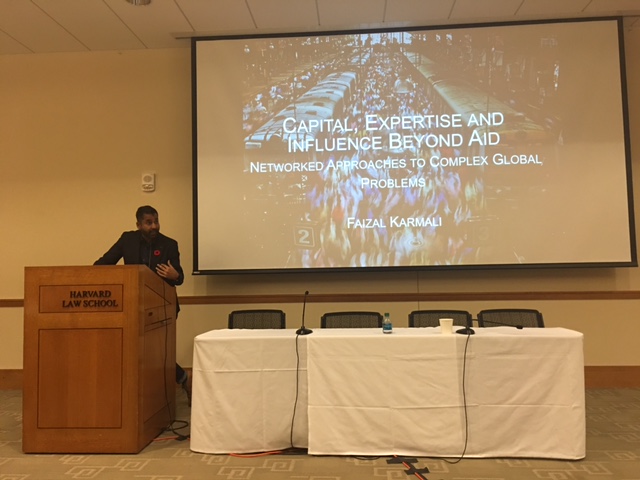By: Seth Norris
Mr. Faizal Karmali (Associate Director, Network Engagement & Bellagio Programs, Rockefeller Center) gave the closing address at the LIDS 2017 Symposium. His speech highlighted the increasing importance of working across discrete global networks to effectively implement international development projects. Specifically, Mr. Karmali looked at the relative influence of individuals, government, civil society, and the private sector across the networks of capital, expertise and influence.
Mr. Karmali began his talk by noting that government and civil society are by far the largest sources of capital investment for international development projects. However, the contributions of these two groups is by no means equal, with the total giving of the top 50 NGOs still falling 6 billion dollars short of the budget cuts to USAID proposed by the Trump White House.
Next came a discussion of international networks dedicated to providing expertise for development projects, with government and civil society being cast as the predominate providers, given that funds directed to private sector consulting firms through USAID are still merely extensions of government backed development finance.
Finally, Mr. Karmali touched on influence networks, arguing that the government and private sectors have traditionally held the most sway. This influence can have both positive and negative elements, as Mr. Karmali highlighted by recounting the effect that US subsidies of ethanol production have had in increasing global food prices, partially contributing to the outbreak of events like the Arab Spring uprising in 2010.
Mr. Karmali concluded by highlighting several NGOs who have succeeded in working across networks to effectively implement international development projects, including BRAC, the world’s largest NGO, and the Aga Khan Development Network, which currently has operations in over 30 countries. By pursuing both non-profit and for-profit endeavors, these NGOs have been able to dramatically increase the effectiveness of their development projects by pooling resources across the networks of capital, expertise and influence. Mr. Karmali ended his remarks by encouraging those in attendance, whether they aspired to work in international development or not, to consider what they might do to further international development goals around the globe.
About the blogger: Seth Norris is a member of the JD Class of 2019 at Harvard Law School. Before coming to Harvard, Seth earned his B.A. in East Languages and Literature from Yale University.
Follow Harvard Law and International Development Society on Facebook and Twitter (@HarvardLIDS).

